#book a guide
Explore tagged Tumblr posts
Text
Developing Backstory: Bringing Characters to Life

1. Where It All Started: The Character’s Origin
Place of Birth: Where did your character first see the world? Think about the impact of this place—was it a busy city where they had to fight for attention or a quiet village where everyone knew everyone’s business? This location doesn’t just say where they’re from; it shapes how they see the world.
Family and Upbringing: What was their family like? Were their parents loving or distant? Maybe they were raised by someone other than their parents—a mentor, an older sibling, or even alone. Family (or the lack of it) is usually one of the most significant factors in shaping who someone becomes.
Society’s Expectations: What was expected of them when they were young? Possibly, they were born into wealth, with all the pressure to continue the family legacy, or maybe they were raised to be invisible in a world where survival mattered. How does this influence who they are now? Do they accept or reject those expectations?

2. Childhood Events That Left a Mark
First Taste of Conflict: Think about the first time the character realized the world wasn’t a perfect place. Maybe they witnessed violence or faced betrayal. What was that moment, and how did it stick with them? This moment usually lays the foundation for the character’s emotional landscape—fear, hope, ambition, or distrust all come from these early life lessons.
Childhood Dreams: When they were young, what did they want to be? Every child has dreams—did they want to be a knight, a scholar, or even just someone who could travel the world? Did they have to give up these dreams? How does that lost dream shape them now?
Formative Relationships: Who was their first best friend, mentor, or enemy? Childhood friendships and relationships often create deep bonds or wounds that last into adulthood. Did they have a mentor who taught them everything, only to betray them? Did they lose a childhood friend that still haunts them?

3. The Teen Years: Where They Start to Become Who They Are
Trials and Tribulations: What’s the biggest challenge they faced as they grew up? Was it losing a loved one, failing at something important, or maybe being forced into a role they didn’t want? These teenage years are where the emotional armor starts forming—how did the difficulties they faced shape them into the person they are now?
Education or Training: How did they learn what they know? Were they formally trained by an institution, learning everything by the book, or did they learn through experience, like a street-smart survivalist? What impact does their education or lack of it have on how they interact with others?
Teenage Bonds: Did they have a first love or a first major falling out with someone close to them? These experiences often create emotional scars or connections that they carry with them into adulthood. How does that past friendship or romance influence their behavior now?

4. Key Life Events: The Big Moments That Define Them
Trauma or Loss: Was there a moment that changed everything? Think about a significant loss—maybe a loved one, their home, or a sense of identity. How does this event affect their worldview? Do they build walls around themselves or dive into relationships with reckless abandon because they fear losing more?
Victory or Failure: Did they experience a moment of triumph or devastating defeat? Success and failure leave their marks. Were they celebrated as a hero once, leading them to overconfidence, or did they fail when everyone was counting on them, leading to crippling self-doubt?
Betrayal: Was there a betrayal that shaped their adult relationships? Whether it is a friend, family member, or lover, betrayal often changes how we trust others. Do they close themselves off, constantly expecting betrayal, or try to rebuild trust, afraid of being left alone again.

5. Where They Stand Now: The Present Moment
What Drives Them Today: What’s the one thing pushing them forward now? Is it revenge, the need to restore their family’s honor, or maybe even just survival? Whatever it is, this motivation should tie directly back to their experiences.
Emotional Baggage: What unresolved emotional wounds are they carrying? Everyone has scars from their past—some are visible, others not so much. How do these emotional wounds affect how they treat others, how they react to conflict, and how they move through the world.
Current Relationships: Who’s still in their life from their past, and how do they feel about it? Did they reconnect with someone they thought they’d lost, or are they haunted by unresolved issues with people from their past? Do they have any ongoing tensions or regrets tied to these people?

6. Tying Themes to Their Backstory
Cultural or Mythological Influence: How does their personal story tie into the larger world’s mythology or culture? Do they carry a family legacy, a curse, or a prophecy that hangs over them? How does this influence their interactions with others and their perception of themselves?
Recurring Symbols: Are there objects, dreams, or people that keep showing up in their life, symbolizing their journey? Perhaps a recurring nightmare haunts them, or they carry an object from their past that’s both a source of comfort and pain

7. Character Arc: The Journey from Past to Present
How Does Their Past Shape Their Growth?: Every character has emotional baggage that needs resolving. How does their backstory drive their arc? Do they need to forgive themselves, let go of the past, or accept who they’ve become to move forward?
Unanswered Questions from the Past: Are there any mysteries in their backstory they need to solve? Maybe they’re unaware of their true parentage, or maybe there’s a forgotten event from their childhood that will resurface and change everything.
#writerscommunity#character backstory guide#writer community#writerscorner#creative writers#writeblr#writerblr#writers on tumblr#writers#free resources#tips and tricks#writing advice#fantasy writing#fiction writing#tumblr writing community#writing a book#writing#writing guide#story writing#writing help#writing resources#writing stuff
4K notes
·
View notes
Text
Kickstarting a book to end enshittification, because Amazon will not carry it

My next book is The Internet Con: How to Seize the Means of Computation: it’s a Big Tech disassembly manual that explains how to disenshittify the web and bring back the old good internet. The hardcover comes from Verso on Sept 5, but the audiobook comes from me — because Amazon refuses to sell my audio:
https://www.kickstarter.com/projects/doctorow/the-internet-con-how-to-seize-the-means-of-computation
Amazon owns Audible, the monopoly audiobook platform that controls >90% of the audio market. They require mandatory DRM for every book sold, locking those books forever to Amazon’s monopoly platform. If you break up with Amazon, you have to throw away your entire audiobook library.
That’s a hell of a lot of leverage to hand to any company, let alone a rapacious monopoly that ran a program targeting small publishers called “Project Gazelle,” where execs were ordered to attack indie publishers “the way a cheetah would pursue a sickly gazelle”:
https://www.businessinsider.com/sadistic-amazon-treated-book-sellers-the-way-a-cheetah-would-pursue-a-sickly-gazelle-2013-10
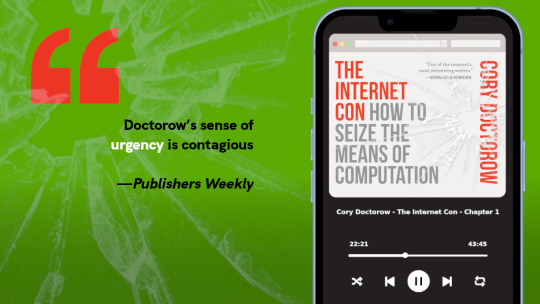
[Image ID: Journalist and novelist Doctorow (Red Team Blues) details a plan for how to break up Big Tech in this impassioned and perceptive manifesto….Doctorow’s sense of urgency is contagious -Publishers Weekly]
I won’t sell my work with DRM, because DRM is key to the enshittification of the internet. Enshittification is why the old, good internet died and became “five giant websites filled with screenshots of the other four” (h/t Tom Eastman). When a tech company can lock in its users and suppliers, it can drain value from both sides, using DRM and other lock-in gimmicks to keep their business even as they grow ever more miserable on the platform.
Here is how platforms die: first, they are good to their users; then they abuse their users to make things better for their business customers; finally, they abuse those business customers to claw back all the value for themselves. Then, they die:
https://pluralistic.net/2023/01/21/potemkin-ai/#hey-guys
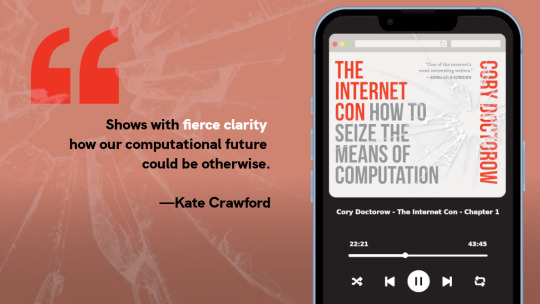
[Image ID: A brilliant barn burner of a book. Cory is one of the sharpest tech critics, and he shows with fierce clarity how our computational future could be otherwise -Kate Crawford, author of The Atlas of AI”]
The Internet Con isn’t just an analysis of where enshittification comes from: it’s a detailed, shovel-ready policy prescription for halting enshittification, throwing it into reverse and bringing back the old, good internet.
How do we do that? With interoperability: the ability to plug new technology into those crapulent, decaying platform. Interop lets you choose which parts of the service you want and block the parts you don’t (think of how an adblocker lets you take the take-it-or-leave “offer” from a website and reply with “How about nah?”):
https://www.eff.org/deeplinks/2019/07/adblocking-how-about-nah
But interop isn’t just about making platforms less terrible — it’s an explosive charge that demolishes walled gardens. With interop, you can leave a social media service, but keep talking to the people who stay. With interop, you can leave your mobile platform, but bring your apps and media with you to a rival’s service. With interop, you can break up with Amazon, and still keep your audiobooks.
So, if interop is so great, why isn’t it everywhere?
Well, it used to be. Interop is how Microsoft became the dominant operating system:
https://www.eff.org/deeplinks/2019/06/adversarial-interoperability-reviving-elegant-weapon-more-civilized-age-slay
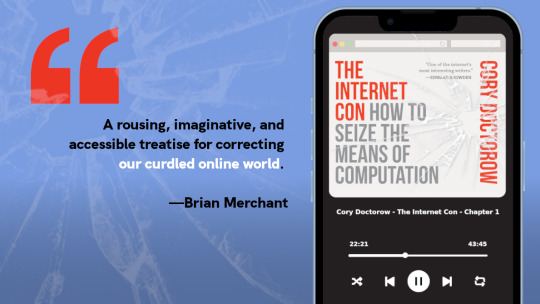
[Image ID: Nobody gets the internet-both the nuts and bolts that make it hum and the laws that shaped it into the mess it is-quite like Cory, and no one’s better qualified to deliver us a user manual for fixing it. That’s The Internet Con: a rousing, imaginative, and accessible treatise for correcting our curdled online world. If you care about the internet, get ready to dedicate yourself to making interoperability a reality. -Brian Merchant, author of Blood in the Machine]
It’s how Apple saved itself from Microsoft’s vicious campaign to destroy it:
https://www.eff.org/deeplinks/2019/06/adversarial-interoperability-reviving-elegant-weapon-more-civilized-age-slay
Every tech giant used interop to grow, and then every tech giant promptly turned around and attacked interoperators. Every pirate wants to be an admiral. When Big Tech did it, that was progress; when you do it back to Big Tech, that’s piracy. The tech giants used their monopoly power to make interop without permission illegal, creating a kind of “felony contempt of business model” (h/t Jay Freeman).
The Internet Con describes how this came to pass, but, more importantly, it tells us how to fix it. It lays out how we can combine different kinds of interop requirements (like the EU’s Digital Markets Act and Massachusetts’s Right to Repair law) with protections for reverse-engineering and other guerrilla tactics to create a system that is strong without being brittle, hard to cheat on and easy to enforce.
What’s more, this book explains how to get these policies: what existing legislative, regulatory and judicial powers can be invoked to make them a reality. Because we are living through the Great Enshittification, and crises erupt every ten seconds, and when those crises occur, the “good ideas lying around” can move from the fringes to the center in an eyeblink:
https://pluralistic.net/2023/06/12/only-a-crisis/#lets-gooooo

[Image ID: Thoughtfully written and patiently presented, The Internet Con explains how the promise of a free and open internet was lost to predatory business practices and the rush to commodify every aspect of our lives. An essential read for anyone that wants to understand how we lost control of our digital spaces and infrastructure to Silicon Valley’s tech giants, and how we can start fighting to get it back. -Tim Maughan, author of INFINITE DETAIL]
After all, we’ve known Big Tech was rotten for years, but we had no idea what to do about it. Every time a Big Tech colossus did something ghastly to millions or billions of people, we tried to fix the tech company. There’s no fixing the tech companies. They need to burn. The way to make users safe from Big Tech predators isn’t to make those predators behave better — it’s to evacuate those users:
https://pluralistic.net/2023/07/18/urban-wildlife-interface/#combustible-walled-gardens
I’ve been campaigning for human rights in the digital world for more than 20 years; I’ve been EFF’s European Director, representing the public interest at the EU, the UN, Westminster, Ottawa and DC. This is the subject I’ve devoted my life to, and I live my principles. I won’t let my books be sold with DRM, which means that Audible won’t carry my audiobooks. My agent tells me that this decision has cost me enough money to pay off my mortgage and put my kid through college. That’s a price I’m willing to pay if it means that my books aren’t enshittification bait.
But not selling on Audible has another cost, one that’s more important to me: a lot of readers prefer audiobooks and 9 out of 10 of those readers start and end their searches on Audible. When they don’t find an author there, they assume no audiobook exists, period. It got so bad I put up an audiobook on Amazon — me, reading an essay, explaining how Audible rips off writers and readers. It’s called “Why None of My Audiobooks Are For Sale on Audible”:
https://pluralistic.net/2022/07/25/can-you-hear-me-now/#acx-ripoff
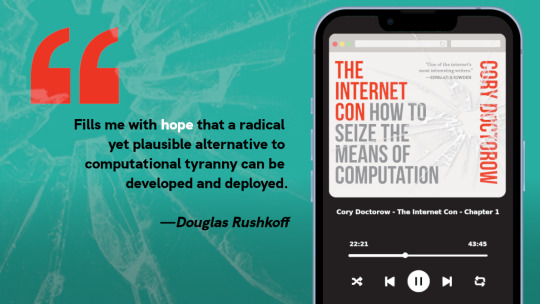
[Image ID: Doctorow has been thinking longer and smarter than anyone else I know about how we create and exchange value in a digital age. -Douglas Rushkoff, author of Present Shock]
To get my audiobooks into readers’ ears, I pre-sell them on Kickstarter. This has been wildly successful, both financially and as a means of getting other prominent authors to break up with Amazon and use crowdfunding to fill the gap. Writers like Brandon Sanderson are doing heroic work, smashing Amazon’s monopoly:
https://www.brandonsanderson.com/guest-editorial-cory-doctorow-is-a-bestselling-author-but-audible-wont-carry-his-audiobooks/
And to be frank, I love audiobooks, too. I swim every day as physio for a chronic pain condition, and I listen to 2–3 books/month on my underwater MP3 player, disappearing into an imaginary world as I scull back and forth in my public pool. I’m able to get those audiobooks on my MP3 player thanks to Libro.fm, a DRM-free store that supports indie booksellers all over the world:
https://blog.libro.fm/a-qa-with-mark-pearson-libro-fm-ceo-and-co-founder/
Producing my own audiobooks has been a dream. Working with Skyboat Media, I’ve gotten narrators like @wilwheaton, Amber Benson, @neil-gaiman and Stefan Rudnicki for my work:
https://craphound.com/shop/

[Image ID: “This book is the instruction manual Big Tech doesn’t want you to read. It deconstructs their crummy products, undemocratic business models, rigged legal regimes, and lies. Crack this book and help build something better. -Astra Taylor, author of Democracy May Not Exist, but We’ll Miss It When Its Gone”]
But for this title, I decided that I would read it myself. After all, I’ve been podcasting since 2006, reading my own work aloud every week or so, even as I traveled the world and gave thousands of speeches about the subject of this book. I was excited (and a little trepedatious) at the prospect, but how could I pass up a chance to work with director Gabrielle de Cuir, who has directed everyone from Anne Hathaway to LeVar Burton to Eric Idle?
Reader, I fucking nailed it. I went back to those daily recordings fully prepared to hate them, but they were good — even great (especially after my engineer John Taylor Williams mastered them). Listen for yourself!
https://archive.org/details/cory_doctorow_internet_con_chapter_01
I hope you’ll consider backing this Kickstarter. If you’ve ever read my free, open access, CC-licensed blog posts and novels, or listened to my podcasts, or come to one of my talks and wished there was a way to say thank you, this is it. These crowdfunders make my DRM-free publishing program viable, even as audiobooks grow more central to a writer’s income and even as a single company takes over nearly the entire audiobook market.
Backers can choose from the DRM-free audiobook, DRM-free ebook (EPUB and MOBI) and a hardcover — including a signed, personalized option, fulfilled through the great LA indie bookstore Book Soup:
https://www.kickstarter.com/projects/doctorow/the-internet-con-how-to-seize-the-means-of-computation
What’s more, these ebooks and audiobooks are unlike any you’ll get anywhere else because they are sold without any terms of service or license agreements. As has been the case since time immemorial, when you buy these books, they’re yours, and you are allowed to do anything with them that copyright law permits — give them away, lend them to friends, or simply read them with any technology you choose.
As with my previous Kickstarters, backers can get their audiobooks delivered with an app (from libro.fm) or as a folder of MP3s. That helps people who struggle with “sideloading,” a process that Apple and Google have made progressively harder, even as they force audiobook and ebook sellers to hand over a 30% app tax on every dollar they make:
https://www.kickstarter.com/projects/doctorow/red-team-blues-another-audiobook-that-amazon-wont-sell/posts/3788112
Enshittification is rotting every layer of the tech stack: mobile, payments, hosting, social, delivery, playback. Every tech company is pulling the rug out from under us, using the chokepoints they built between audiences and speakers, artists and fans, to pick all of our pockets.
The Internet Con isn’t just a lament for the internet we lost — it’s a plan to get it back. I hope you’ll get a copy and share it with the people you love, even as the tech platforms choke off your communities to pad their quarterly numbers.

Next weekend (Aug 4-6), I'll be in Austin for Armadillocon, a science fiction convention, where I'm the Guest of Honor:
https://armadillocon.org/d45/

If you'd like an essay-formatted version of this thread to read or share, here's a link to it on pluralistic.net, my surveillance-free, ad-free, tracker-free blog:
https://pluralistic.net/2023/07/31/seize-the-means-of-computation/#the-internet-con

[Image ID: My forthcoming book 'The Internet Con: How to Seize the Means of Computation' in various editions: Verso hardcover, audiobook displayed on a phone, and ebook displayed on an e-ink reader.]
#pluralistic#trustbusting#big tech#gift guide#kickstarter#the internet con#books#audiobooks#enshitiffication#disenshittification#crowdfunders#seize the means of computation#audible#amazon#verso
15K notes
·
View notes
Text
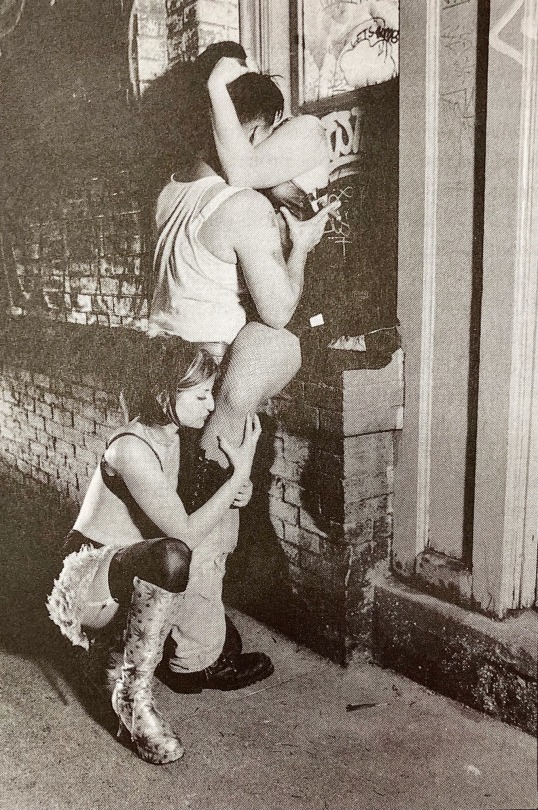
"A prime example of leasin' some lovin'." (Photographed by Phyllis Christopher.)
source: The Femme's Guide to the Universe, written by Shar Rednour
#lesbian literature#lesbian#dyke#thatbutcharchivist#archived#lesbian books#lesbian photography#publisher: alyson publications inc.#femme4butch#butch4femme#femme#butch#femme lesbian#butch lesbian#butch femme#femme butch#year: 2000#the femme's guide to the universe#author: shar rednour#shar rednour#photographer: phyllis christopher
4K notes
·
View notes
Text
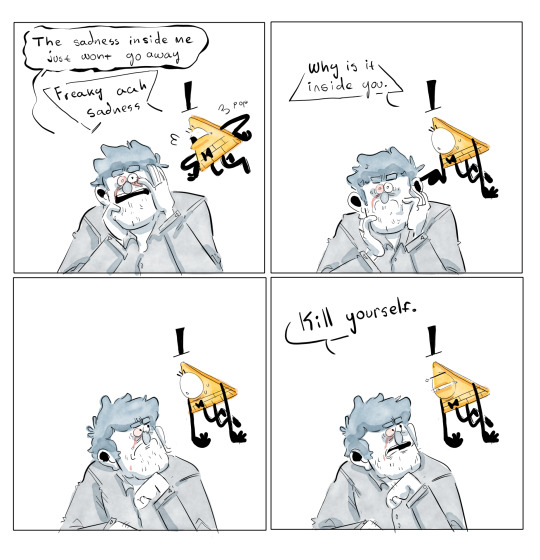
i think they're gonna make it, guys
src
#billford#stanford pines#bill cipher#gravity falls#the book of bill#writing a relationship guide book#gonna call it 'knives needles and poison: what YOU need to spice up your sex life'#hahaha just kidding . unless#stump art
1K notes
·
View notes
Text
25 Prose Tips For Writers 🖋️✨ Part 1
Hey there!📚✨
As writers, we all know that feeling when we read a sentence so beautifully crafted that it takes our breath away. We pause, reread it, and marvel at how the author managed to string those words together in such a captivating way. Well, today I'm going to unpack a few secrets to creating that same magic in your own writing. These same tips I use in my writing.
But before I begin, please remember that writing is an art form, and like any art, it's subjective. What sounds beautiful to one person might not resonate with another. The tips I'm about to share are meant to be tools in your writer's toolkit, not rigid rules. Feel free to experiment, play around, and find what works best for your unique voice and style.
Power of Rhythm 🎵
One of the most overlooked aspects of beautiful prose is rhythm. Just like music, writing has a flow and cadence that can make it pleasing to the ear (or mind's ear, in this case). Here are some ways to incorporate rhythm into your writing:
a) Vary your sentence length: Mix short, punchy sentences with longer, flowing ones. This creates a natural ebb and flow that keeps your reader engaged.
Example: "The sun set. Darkness crept in, wrapping the world in its velvet embrace. Stars winked to life, one by one, until the sky was a glittering tapestry of light."
b) Use repetition strategically: Repeating words or phrases can create a hypnotic effect and emphasize important points.
Example: "She walked through the forest, through the shadows, through the whispers of ancient trees. Through it all, she walked with purpose."
c) Pay attention to the stressed syllables: In English, we naturally stress certain syllables in words. Try to end important sentences with stressed syllables for a stronger impact.
Example: "Her heart raced as she approached the door." (Stronger ending) vs. "She approached the door as her heart raced." (Weaker ending)
Paint with Words 🎨
Beautiful prose often creates vivid imagery in the reader's mind. Here are some techniques to help you paint with words:
a) Use specific, concrete details: Instead of general descriptions, zoom in on particular details that bring a scene to life.
Example: Instead of: "The room was messy." Try: "Crumpled papers overflowed from the waste bin, books lay spine-up on every surface, and a half-eaten sandwich peeked out from under a stack of wrinkled clothes."
b) Appeal to all five senses: Don't just describe what things look like. Include smells, sounds, textures, and tastes to create a fully immersive experience.
Example: "The market bustled with life. Colorful fruits glistened in the morning sun, their sweet aroma mingling with the earthy scent of fresh herbs. Vendors called out their wares in sing-song voices, while customers haggled in animated tones. Sarah's fingers brushed against the rough burlap sacks of grain as she passed, and she could almost taste the tang of ripe oranges on her tongue."
c) Use unexpected comparisons: Fresh similes and metaphors can breathe new life into descriptions.
Example: Instead of: "The old man was very thin." Try: "The old man was a whisper of his former self, as if life had slowly erased him, leaving behind only the faintest outline."
Choose Your Words Wisely 📚
Every word in your prose should earn its place. Here are some tips for selecting the right words:
a) Embrace strong verbs: Replace weak verb + adverb combinations with single, powerful verbs.
Example: Instead of: "She walked quickly to the store." Try: "She hurried to the store." or "She dashed to the store."
b) Be specific: Use precise nouns instead of general ones.
Example: Instead of: "She picked up the flower." Try: "She plucked the daisy."
c) Avoid clichés: Clichés can make your writing feel stale. Try to find fresh ways to express common ideas.
Example: Instead of: "It was raining cats and dogs." Try: "The rain fell in sheets, transforming the streets into rushing rivers."
Play with Sound 🎶
The sound of words can contribute greatly to the beauty of your prose. Here are some techniques to make your writing more musical:
a) Alliteration: Repeating initial consonant sounds can create a pleasing effect.
Example: "She sells seashells by the seashore."
b) Assonance: Repeating vowel sounds can add a subtle musicality to your prose.
Example: "The light of the bright sky might ignite a fight."
c) Onomatopoeia: Using words that sound like what they describe can make your writing more immersive.
Example: "The bees buzzed and hummed as they flitted from flower to flower."
Art of Sentence Structure 🏗️
How you structure your sentences can greatly affect the flow and impact of your prose. Here are some tips:
a) Use parallel structure: When listing items or actions, keep the grammatical structure consistent.
Example: "She came, she saw, she conquered."
b) Try periodic sentences: Build suspense by putting the main clause at the end of the sentence.
Example: "Through storm and strife, across oceans and continents, despite all odds and obstacles, they persevered."
c) Experiment with sentence fragments: While not grammatically correct, sentence fragments can be powerful when used intentionally for emphasis or style.
Example: "She stood at the edge of the cliff. Heart racing. Palms sweating. Ready to jump."
Power of White Space ⬜
Sometimes, what you don't say is just as important as what you do. Use paragraph breaks and short sentences to create pauses and emphasize important moments.
Example: "He opened the letter with trembling hands.
Inside, a single word.
'Yes.'"
Read Your Work Aloud 🗣️
One of the best ways to polish your prose is to read it aloud. This helps you catch awkward phrasing, repetitive words, and rhythm issues that you might miss when reading silently.
Edit Ruthlessly ✂️
Beautiful prose often comes from rigorous editing. Don't be afraid to cut words, sentences, or even entire paragraphs if they don't serve the overall beauty and effectiveness of your writing.
Study the Masters 📖
Please! Read widely and pay attention to how your favorite authors craft their prose. Analyze sentences you find particularly beautiful and try to understand what makes them work.
Practice, Practice, Practice 💪
Like any skill, writing beautiful prose takes practice. Set aside time to experiment with different techniques and styles. Try writing exercises focused on specific aspects of prose, like describing a scene using only sound words, or rewriting a simple sentence in ten different ways.
Remember, that developing your prose style is a journey, not a destination. It's okay if your first draft isn't perfect – that's what editing is for! The most important thing is to keep writing, keep experimenting, and keep finding joy in the process.
Here are a few more unique tips to help you on your prose-perfecting journey:
Create a Word Bank 🏦
Keep a notebook or digital file where you collect beautiful words, phrases, or sentences you come across in your reading. This can be a great resource when you're looking for inspiration or the perfect word to complete a sentence.
Use the "Rule of Three" 3️⃣
There's something inherently satisfying about groups of three. Use this to your advantage in your writing, whether it's in listing items, repeating phrases, or structuring your paragraphs.
Example: "The old house groaned, creaked, and whispered its secrets to the night."
Power of Silence 🤫
Sometimes, the most powerful prose comes from what's left unsaid. Use implication and subtext to add depth to your writing.
Example: Instead of: "She was heartbroken when he left." Try: "She stared at his empty chair across the breakfast table, the untouched coffee growing cold."
Play with Perspective 👁️
Experiment with different points of view to find the most impactful way to tell your story. Sometimes, an unexpected perspective can make your prose truly memorable.
Example: Instead of describing a bustling city from a human perspective, try describing it from the point of view of a bird soaring overhead, or a coin passed from hand to hand.
Use Punctuation Creatively 🖋️
While it's important to use punctuation correctly, don't be afraid to bend the rules a little for stylistic effect. Em dashes, ellipses, and even unconventional use of periods can add rhythm and emphasis to your prose.
Example: "She hesitated—heart pounding, palms sweating—then knocked on the door."
Create Contrast 🌓
Juxtapose different elements in your writing to create interest and emphasis. This can be in terms of tone, pacing, or even the literal elements you're describing.
Example: "The delicate butterfly alighted on the rusted barrel of the abandoned tank."
Use Synesthesia 🌈
Synesthesia is a condition where one sensory experience triggers another. While not everyone experiences this, using synesthetic descriptions in your writing can create vivid and unique imagery.
Example: "The violin's melody tasted like honey on her tongue."
Experiment with Sentence Diagrams 📊
Remember those sentence diagrams from school? Try diagramming some of your favorite sentences from literature. This can give you insight into how complex sentences are structured and help you craft your own.
Create a Sensory Tour 🚶♀️
When describing a setting, try taking your reader on a sensory tour. Move from one sense to another, creating a full, immersive experience.
Example: "The old bookstore welcomed her with the musty scent of aging paper. Dust motes danced in the shafts of sunlight piercing the high windows. Her fingers trailed over the cracked leather spines as she moved deeper into the stacks, the floorboards creaking a greeting beneath her feet. In the distance, she could hear the soft ticking of an ancient clock and taste the faint bitterness of old coffee in the air."
Use Active Voice (Most of the Time) 🏃♂️
While passive voice has its place, active voice generally creates more dynamic and engaging prose. Compare these two sentences:
Passive: "The ball was thrown by the boy." Active: "The boy threw the ball."
Magic of Ordinary Moments ✨
Sometimes, the most beautiful prose comes from describing everyday occurrences in a new light. Challenge yourself to find beauty and meaning in the mundane.
Example: "The kettle's whistle pierced the quiet morning, a clarion call heralding the day's first cup of possibility."
Play with Time ⏳
Experiment with how you present the passage of time in your prose. You can stretch a moment out over several paragraphs or compress years into a single sentence.
Example: "In that heartbeat between his question and her answer, universes were born and died, civilizations rose and fell, and their entire future hung in the balance."
Use Anaphora for Emphasis 🔁
Anaphora is the repetition of a word or phrase at the beginning of successive clauses or sentences. It can create a powerful rhythm and emphasize key points.
Example: "She was the sunrise after the longest night. She was the first bloom of spring after a harsh winter. She was the cool breeze on a sweltering summer day. She was hope personified, walking among us."
Create Word Pictures 🖼️
Try to create images that linger in the reader's mind long after they've finished reading. These don't have to be elaborate – sometimes a simple, unexpected combination of words can be incredibly powerful.
Example: "Her laughter was a flock of birds taking flight."
Use Rhetorical Devices 🎭
Familiarize yourself with rhetorical devices like chiasmus, antithesis, and oxymoron. These can add depth and interest to your prose.
Example of chiasmus: "Ask not what your country can do for you – ask what you can do for your country." - John F. Kennedy
Even the most accomplished authors continue to hone their craft with each new piece they write. Don't be discouraged if your first attempts don't sound exactly like you imagined – keep practicing, keep experimenting, and most importantly, keep writing.
Your unique voice and perspective are what will ultimately make your prose beautiful. These techniques are simply tools to help you express that voice more effectively. Use them, adapt them, or discard them as you see fit. The most important thing is to write in a way that feels authentic to you and brings you joy.
Happy writing, everyone! 🖋️💖📚 - Rin T
Hey fellow writers! I'm super excited to share that I've just launched a Tumblr community. I'm inviting all of you to join my community. All you have to do is fill out this Google form, and I'll personally send you an invitation to join the Write Right Society on Tumblr! Can't wait to see your posts!
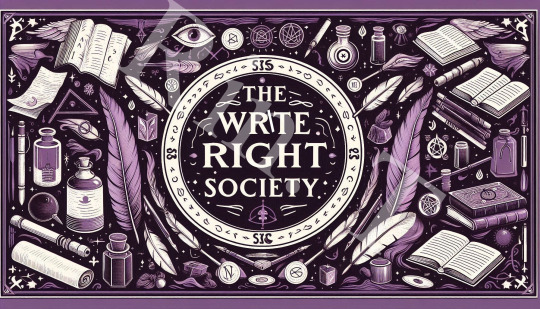
#writing tips#on writing#creative writing#writers block#writing#how to write#thewriteadviceforwriters#writers and poets#writers on tumblr#writeblr#aspiring author#author#book writing#indie author#writer#indie writer#authors of tumblr#fiction writing#writing a book#writing advice#writing blog#writing community#writing guide#writing help#writing characters#writing ideas#writing inspiration#novel writing#romance writing#writing reference
2K notes
·
View notes
Text
warrior cat designs based on those fuckass ultimate guide color palettes
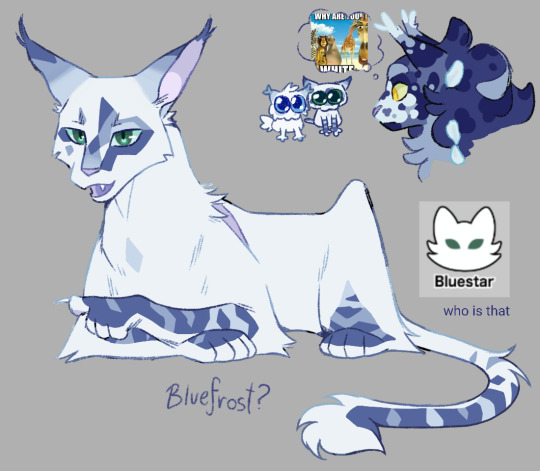


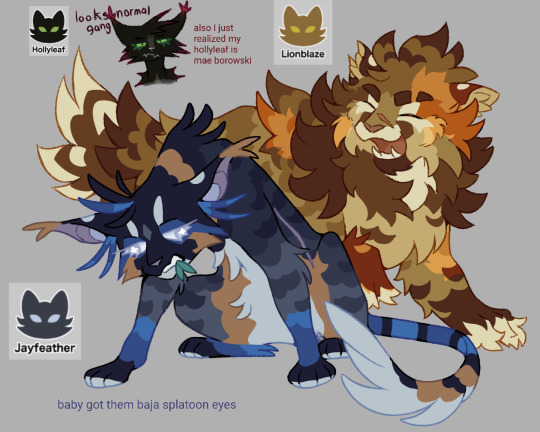
Swatch diagrams made by @/Sunnyfall , please look at them because what was happening behind the curtains that lead to cinderheart being blonde and ivypool brown
#hello warriors fandom i havent read a book in years#this entire thing is funny because whoever chose those swatches clearly had 0 idea what was going on#yellowfang ivypool and runningnose all have the same colour and its Not gray#art#bluestar#leafstar#dovewing#jayfeather#lionblaze#warriors#moonflower#hollyleaf#wc#warrior cats#wc designs#warrior cats designs#warrior cat designs#my 12yo self leapt at the opportunity to draw the murder cats again#warriors ultimate guide
6K notes
·
View notes
Text

Is this anything?
#hiiiiii hitchhiker's guide fandom i'm making my entrance#since i finally got around to reading the book and am now obsessed#hhgttg#hgttg#h2g2#the hitchhiker's guide to the galaxy#hitchhikers guide
1K notes
·
View notes
Text

GET BOOKT
A guide of books to gift the people in your life and yourself!
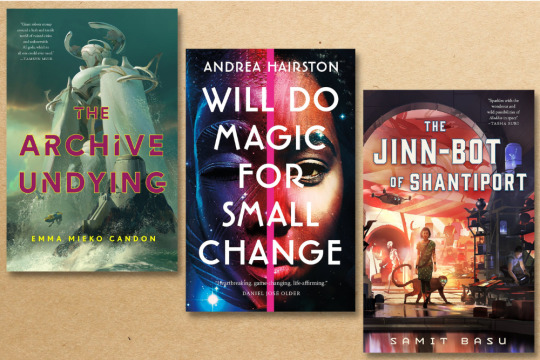
For the person who made a 200+ slide powerpoint about Neon Genesis Evangelion for a presentation party… Also for those who attend presentation parties…
The Archive Undying by @emcandon
For all former and current theater kids (affectionate)...
Will Do Magic for Small Change by Andrea Hairston
For the reader who prefers their off-the-wall science fiction tempered with social commentary, or enjoys social commentary in a space opera font…
The Jinn-Bot of Shantiport by Samit Basu
━ ˖°˖ ☾☆☽ ˖°˖ ━
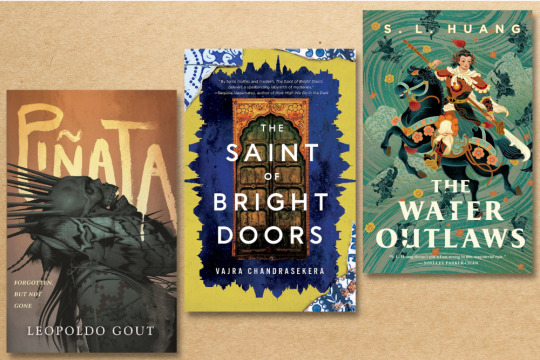
For the friend with the SHUDDER account…
Piñata: A Novel by Leopoldo Gout
For the burned-out chosen one who’s so, so tired…
The Saint of Bright Doors by @adamantine
For the tumblr mutual that fell down the wuxia cdrama hole…
The Water Outlaws by S. L. Huang
━ ˖°˖ ☾☆☽ ˖°˖ ━
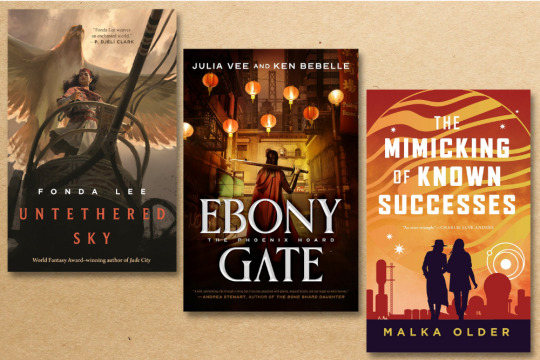
For the gamer who fondly remembers their confrontation with Rayquaza atop the Sky Pillar…
Untethered Sky by Fonda Lee
For the “smash first, questions later” friend in your life…
Ebony Gate by Julia Vee & Ken Bebelle
For a tragic superwholockian in dire need of restorative sapphic fiction…
The Mimicking of Known Successes by Malka Older
━ ˖°˖ ☾☆☽ ˖°˖ ━

For the reader who wished Jonathan Strange & Mr Norrell was actually Jonathan Strange/Mr Norrell…
The Last Binding trilogy by @fahye, including:
● A Marvellous Light
● A Restless Truth
● A Power Unbound
━ ˖°˖ ☾☆☽ ˖°˖ ━
Not enough books? We agree. Check out our other GET BOOKT guide.
#get bookt#booklr#tor books#tor publishing group#gift guide#the water outlaws#s l huang#ebony gate#julia vee#ken bebelle#untethered sky#fonda lee#the saint of bright doors#vajra chandrasekera#the mimicking of known successes#malka older#piñata#piñata: a novel#leopoldo gout#a marvellous light#a restless truth#a power unbound#freya marske#the archive undying#emma mieko candon#will do magic for small change#andrea hairston#the jinn-bot of shantiport#samit basu
5K notes
·
View notes
Text



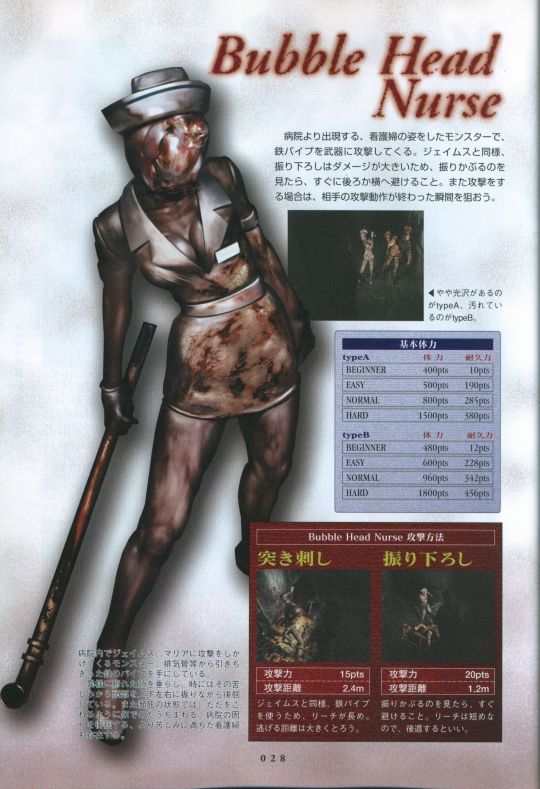
Monsters in Silent Hill 2 official complete strategy & world guide book (2001) Designed By: Masahiro Ito
7K notes
·
View notes
Text

People who don’t straight up read the sourcebooks are missing out on some banger lines. “A goddammit of Tremere” is fucking hilarious
#vampire the masquerade#vtm#vtm player’s guide#also a big fan of ‘there’s no ethical consumption under vampirism’ from the wta v5 core book#world of darkness
2K notes
·
View notes
Text
imagine reading a book and not making it your entire personality for at least 5 months
#i could literally never#absolutely unimaginable#lockwood & co#lockwood and co#percy jackson#percy jackon and the olympians#a good girl's guide to murder#agggtm#daughter of the deep#heartstopper#solitaire by alice oseman#radio silence#i was born for this#alice oseman#and literally every other wonderful book ive ever read
1K notes
·
View notes
Text
"We are going to defeat Dracula with two things: Garlic, and the ✨Power Of Friendship ✨💕💫😻😽😸🥳🫶🤩🥰🥰. Here, I made crucifix Friendship bracelets! 🥰✝️📿" - Abraham Van Helsing, Dracula
#he'd make a great girl guide methinks#also no spoilers pls i haven't finished the book yet 😌 I hope he makes crucifix friendship bracelets though#the power of friendship#friendship is magic#inspirational#quotes#van helsing#abraham van helsing#dracula#friendship bracelets#arts and crafts
707 notes
·
View notes
Text
Sandra Newman’s “Julia”
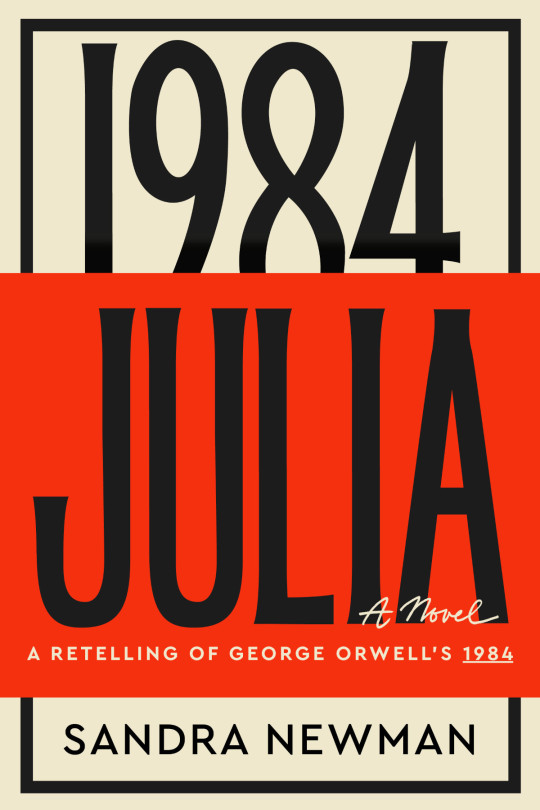
The first chapter of Orwell's Nineteen Eighty-Four has a fantastic joke that nearly everyone misses: when Julia, Winston Smith's love interest, is introduced, she has oily hands and a giant wrench, which she uses in her "mechanical job on one of the novel-writing machines":
https://gutenberg.net.au/ebooks01/0100021.txt
That line just kills me every time I re-read the book – Orwell, a novelist, writing a dystopian future in which novels are written by giant, clanking mechanisms. Later on, when Winston and Julia begin their illicit affair, we get more detail:
She could describe the whole process of composing a novel, from the general directive issued by the Planning Committee down to the final touching-up by the Rewrite Squad. But she was not interested in the finished product. She 'didn't much care for reading,' she said. Books were just a commodity that had to be produced, like jam or bootlaces.
I always assumed Orwell was subtweeting his publishers and editors here, and you can only imagine that the editor who asked Orwell to tweak the 1984 manuscript must have felt an uncomfortable parallel between their requests and the notional Planning Committee and Rewrite Squad at the Ministry of Truth.
I first read 1984 in the early winter of, well, 1984, when I was thirteen years old. I was on a family trip that included as visit to my relatives in Leningrad, and the novel made a significant impact on me. I immediately connected it to the canon of dystopian science fiction that I was already avidly consuming, and to the geopolitics of a world that seemed on the brink of nuclear devastation. I also connected it to my own hopes for the nascent field of personal computing, which I'd gotten an early start on, when my father – then a computer science student – started bringing home dumb terminals and acoustic couplers from his university in the mid-1970s. Orwell crystallized my nascent horror at the oppressive uses of technology (such as the automated Mutually Assured Destruction nuclear systems that haunted my nightmares) and my dreams of the better worlds we could have with computers.
It's not an overstatement to say that the rest of my life has been about this tension. It's no coincidence that I wrote a series of "Little Brother" novels whose protagonist calls himself w1n5t0n:
https://craphound.com/littlebrother/Cory_Doctorow_-_Little_Brother.htm
I didn't stop with Orwell, of course. I wrote a whole series of widely read, award-winning stories with the same titles as famous sf tales, starting with "Anda's Game" ("Ender's Game"):
https://www.salon.com/2004/11/15/andas_game/
And "I, Robot":
https://craphound.com/overclocked/Cory_Doctorow_-_Overclocked_-_I_Robot.html
"The Martian Chronicles":
https://escapepod.org/2019/10/03/escape-pod-700-martian-chronicles-part-1/
"True Names":
https://archive.org/details/TrueNames
"The Man Who Sold the Moon":
https://memex.craphound.com/2015/05/22/the-man-who-sold-the-moon/
and "The Brave Little Toaster":
https://archive.org/details/Cory_Doctorow_Podcast_212
Writing stories about other stories that you hate or love or just can't get out of your head is a very old and important literary tradition. As EL Doctorow (no relation) writes in his essay "Genesis," the Hebrews stole their Genesis story from the Babylonians, rewriting it to their specifications:
https://www.penguinrandomhouse.com/books/41520/creationists-by-e-l-doctorow/
As my "famous title" stories and Little Brother books show, this work needn't be confined to antiquity. Modern copyright may be draconian, but it contains exceptions ("fair use" in the US, "fair dealing" in many other places) that allow for this kind of creative reworking. One of the most important fair use cases concerns The Wind Done Gone, Alice Randall's 2001 retelling of Margaret Mitchell's Gone With the Wind from the perspective of the enslaved characters, which was judged to be fair use after Mitchell's heirs tried to censor the book:
https://en.wikipedia.org/wiki/Suntrust_Bank_v._Houghton_Mifflin_Co.
In ruling for Randall, the Eleventh Circuit Court of Appeals emphasized that she had "fully employed those conscripted elements from Gone With the Wind to make war against it." Randall used several of Mitchell's most famous lines, "but vest[ed] them with a completely new significance":
https://law.justia.com/cases/federal/appellate-courts/F3/268/1257/608446/
The Wind Done Gone is an excellent book, and both its text and its legal controversy kept springing to mind as I read Sandra Newman's wonderful novel Julia, which retells 1984 from the perspective of Julia, she of the oily hands the novel-writing machine:
https://www.harpercollins.com/products/julia-sandra-newman?variant=41467936636962
Julia is the kind of fanfic that I love, in the tradition of both Wind Done gone and Rosenkrantz and Gildenstern Are Dead, in which a follow-on author takes on the original author's throwaway world-building with deadly seriousness, elucidating the weird implications and buried subtexts of all the stuff and people moving around in the wings and background of the original.
For Newman, the starting point here is Julia, an enigmatic lover who comes to Winston with all kinds of rebellious secrets – tradecraft for planning and executing dirty little assignations and acquiring black market goods. Julia embodies a common contradiction in the depiction of young women (she is some twenty years younger than Winston): on the one hand, she is a "native" of the world, while Winston is a late arrival, carrying around all his "oldthink" baggage that leaves him perennially baffled, terrified and angry; on the other hand, she's a naive "girl," who "doesn't much care for reading," and lacks the intellectual curiosity that propels Winston through the text.
This contradiction is the cleavage line that Newman drives her chisel into, fracturing Orwell's world in useful, fascinating, engrossing ways. For Winston, the world of 1984 is totalitarian: the Party knows all, controls all and misses nothing. To merely think a disloyal thought is to be doomed, because the omnipotent, omniscient, and omnicompetent Party will sense the thought and mark you for torture and "vaporization."
Orwell's readers experience all of 1984 through Winston's eyes and are encouraged to trust his assessment of his situation. But Newman brings in a second point of view, that of Julia, who is indeed far more worldly than Winston. But that's not because she's younger than him – it's because she's more provincial. Julia, we learn, grew up outside of the Home Counties, where the revolution was incomplete and where dissidents – like her parents – were sent into exile. Julia has experienced the periphery of the Party's power, the places where it is frayed and incomplete. For Julia, the Party may be ruthless and powerful, but it's hardly omnicompetent. Indeed, it's rather fumbling.
Which makes sense. After all, if we take Winston at his word and assume that every disloyal citizen of Oceania is arrested, tortured and murdered, where would that leave Oceania? Even Kim Jong Un can't murder everyone who hates him, or he'd get awfully lonely, and then awfully hungry.
Through Julia's eyes, we experience Oceania as a paranoid autocracy, corrupt and twitchy. We witness the obvious corollary of a culture of denunciation and arrest: the ruling Party of such an institution must be riddled with internecine struggle and backstabbing, to the point of paralyzed dysfunction. The Orwellian trick of switching from being at war with Eastasia to Eurasia and back again is actually driven by real military setbacks – not just faked battles designed to stir up patriotic fervor. The Party doesn't merely claim to be under assault from internal and external enemies – it actually is.
Julia is also perfectly positioned to uncover the vast blank spots in Winston's supposed intellectual curiosity, all the questions he doesn't ask – about her, about the Party, and about the world. I love this trope and used it myself, in Attack Surface, the third "Little Brother" book, which is told from the point of view of Marcus's frenemy Masha:
https://us.macmillan.com/books/9781250757531/attacksurface
Through Julia, we come to understand the seemingly omniscient, omnipotent Party as fumbling sadists. The Thought Police are like MI5, an Island of Misfit Toys where the paranoid, the stupid, the vicious and the thuggish come together to ruin the lives of thousands, in such a chaotic and pointless manner that their victims find themselves spinning devastatingly clever explanations for their behavior:
https://www.bbc.co.uk/blogs/adamcurtis/entries/3662a707-0af9-3149-963f-47bea720b460
And, as with Nineteen Eighty-Four, Julia is a first-rate novel, expertly plotted, with fantastic, nail-biting suspense and many smart turns and clever phrases. Newman is doing Orwell, and, at times, outdoing him. In her hands, Orwell – like Winston – is revealed as a kind of overly credulous romantic who can't believe that anyone as obviously stupid and deranged as the state's representatives could be kicking his ass so very thoroughly.
This was, in many ways, the defining trauma and problem of Orwell's life, from his origin story, in which he is shot through the throat by a fascist: sniper during the Spanish Civil War:
https://www.rjgeib.com/thoughts/soldiers/george-orwell-shot.html
To his final days, when he developed a foolish crush on a British state spy and tried to impress her by turning his erstwhile comrades in to her:
https://en.wikipedia.org/wiki/Orwell%27s_list
Newman's feminist retelling of Orwell is as much about puncturing the myth of male competence as it is about revealing the inner life, agency, and personhood of swooning love-interests. As someone who loves Orwell – but not unconditionally – I was moved, impressed, and delighted by Julia.

Tor Books as just published two new, free LITTLE BROTHER stories: VIGILANT, about creepy surveillance in distance education; and SPILL, about oil pipelines and indigenous landback.
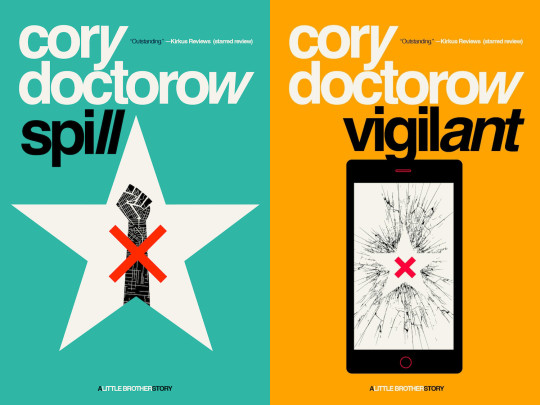

If you'd like an essay-formatted version of this post to read or share, here's a link to it on pluralistic.net, my surveillance-free, ad-free, tracker-free blog:
https://pluralistic.net/2024/09/28/novel-writing-machines/#fanfic
#pluralistic#reviews#books#orwell#george orwell#nineteen eighty-four#1984#little brother#fanfic#remix#gift guide#science fiction#sandra newman
650 notes
·
View notes
Text
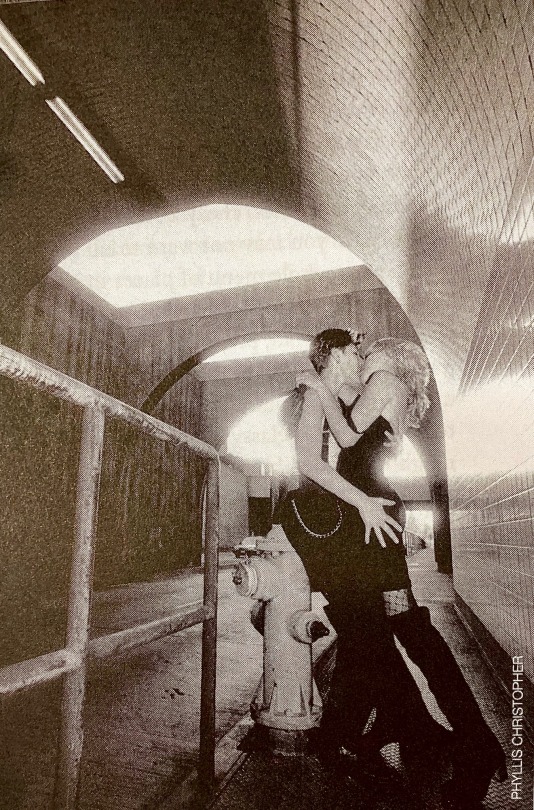
"The Broadway Tunnel seemed to be a safe place for sex--except for the drivers who couldn't keep their eyes on the road!" (Photographed by Phyllis Christopher.)
source: The Femme's Guide to the Universe, written by Shar Rednour
#lesbian literature#lesbian#dyke#thatbutcharchivist#archived#lesbian books#lesbian photography#publisher: alyson publications inc.#femme4butch#butch4femme#butch femme#femme butch#femme lesbian#butch lesbian#butch#femme#year: 2000#author: shar rednour#shar rednour#photographer: phyllis christopher#the femme's guide to the universe
3K notes
·
View notes
Text
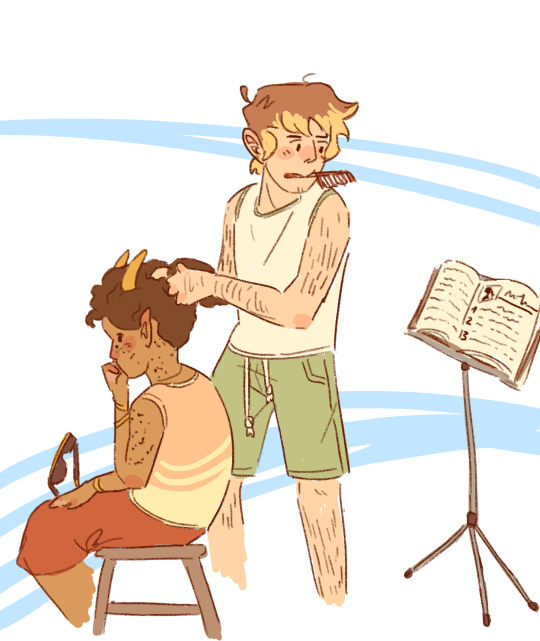
19-year-old girldad learning to braid hair
#qsmp sunnysideup fanart#tubbo fanart#qsmp fanart#qsmp#qsmp tubbo#qsmp sunnysideup#sunnysideup#tubbo#my art#hes doing his best#yes hes using his music sheet stand to prop up the guide book#just a lil doodle
2K notes
·
View notes
Text
The Mini Guide to Crafting Compelling Royal Characters for Fiction Writers
Creating royal characters can be both exciting and challenging. These regal figures often play pivotal roles in stories, capturing readers' imaginations with their power, privilege, and the weight of responsibility they carry. Whether you're writing historical fiction, fantasy, or contemporary novels featuring monarchs, this comprehensive (mini) guide will help you develop authentic, multi-dimensional royal characters that will resonate with your readers.
Understanding the Basics of Royalty
Before diving into character creation, it's essential to have a solid grasp of what royalty entails. Royalty typically refers to members of a ruling family, including kings, queens, princes, princesses, and other nobles within a monarchical system. These individuals are often born into their roles, though some may ascend to power through marriage or other means.
Key aspects to consider:
Hierarchy and succession
Royal duties and responsibilities
Protocol and etiquette
The concept of divine right (in some cultures)
The relationship between royalty and their subjects
Remember, while these elements are common in many royal systems, you have the creative freedom to adapt or reimagine them for your fictional world.
Developing Your Royal Character's Background
Every character, royal or not, needs a rich backstory. For royal characters, this background is particularly crucial as it shapes their worldview, values, and decision-making processes.
Consider the following:
a) Lineage: What is your character's family history? Are they from a long-standing dynasty or a newly established royal house?
b) Upbringing: How were they raised? Were they groomed for leadership from birth, or did they have a more sheltered upbringing?
c) Education: What kind of education did they receive? Was it formal, focusing on statecraft and diplomacy, or more well-rounded?
d) Relationships: How do they relate to their family members, courtiers, and subjects?
e) Personal experiences: What significant events have shaped their character and outlook on life?
Crafting a Unique Personality
Avoid the trap of creating one-dimensional royal stereotypes. Your character should be as complex and nuanced as any other well-developed protagonist or antagonist.
Consider these aspects:
a) Strengths and weaknesses: What are your character's admirable qualities? What flaws do they struggle with?
b) Motivations: What drives them? Is it a sense of duty, personal ambition, or something else entirely?
c) Internal conflicts: What personal struggles do they face? How do these conflicts affect their rule and relationships?
d) Hobbies and interests: What passions do they pursue outside of their royal duties?
e) Sense of humor: How do they express humor, if at all? Is it dry wit, sarcasm, or something else?
Balancing Power and Vulnerability
One of the most intriguing aspects of royal characters is the juxtaposition between their immense power and their human vulnerabilities. This balance can create compelling internal and external conflicts for your character.
Consider:
The weight of responsibility and its impact on their personal life
The isolation that often comes with a royal position
The constant scrutiny they face from the public and court
The struggle between personal desires and duty to the crown
Creating a Believable Royal World
Your royal character doesn't exist in a vacuum (I hope not). They're part of a larger royal ecosystem that includes family members, advisors, courtiers, and subjects. Developing this world adds depth and authenticity to your story.
Key elements to consider:
Court dynamics and politics
Relationships with other noble houses or kingdoms
The role of advisors and how they influence decisions
Traditions and customs specific to your royal setting
The economic and social structure of the kingdom
Addressing the Challenges of Royal Life
Royal characters face unique challenges that can drive your plot and character development. Some common themes include:
a) Succession disputes b) Balancing personal happiness with duty c) Navigating political alliances and conflicts d) Managing public opinion and maintaining legitimacy e) Dealing with threats to their rule or life
Use these challenges to create tension and drive your story forward while revealing more about your character's personality and values.
The Impact of Historical Context
If you're writing historical fiction or a fantasy inspired by real-world monarchies, it's crucial to consider the historical context. Research the time period and culture you're drawing from to ensure authenticity in your character's behavior, beliefs, and challenges.
Key areas to research:
Social norms and expectations of the time
Political systems and power structures
Technology and its impact on governance
Religious beliefs and their influence on royalty
Gender roles and how they affect royal duties and succession
Avoiding Common Pitfalls
When creating royal characters, be mindful of these common mistakes:
a) Making them too perfect or too villainous b) Ignoring the realities of royal life (e.g., lack of privacy, constant duties) c) Overlooking the impact of their decisions on their subjects d) Failing to show growth or change over the course of the story e) Relying too heavily on stereotypes or clichés
Incorporating Royal Etiquette and Protocol
Royal characters often adhere to strict codes of conduct and protocol. While you don't need to become an expert in royal etiquette, incorporating some of these elements can add authenticity to your story:
Forms of address (Your Majesty, Your Highness, etc.)
Court ceremonies and rituals
Dress codes and regalia
Rules of precedence in social situations
Diplomatic protocols when interacting with other royals or dignitaries
Exploring Different Types of Royal Characters
Remember that not all royal characters need to be ruling monarchs. Consider exploring other royal roles, such as:
The rebel prince or princess who rejects their royal duties
The reluctant heir thrust into power unexpectedly
The exiled royal fighting to reclaim their throne
The royal spouse adapting to life in the palace
The illegitimate child discovering their royal heritage
Each of these archetypes offers unique storytelling opportunities and challenges for character development.
Balancing Historical Accuracy and Creative License
If you're writing historical fiction featuring real royalty, you'll need to strike a balance between historical accuracy and creative interpretation. While it's important to respect known facts and timelines, you also have the freedom to explore the inner lives and motivations of these historical figures.
Tips for balancing accuracy and creativity:
Thoroughly research the historical figure and their time period
Clearly differentiate between historical fact and fictional interpretation
Use author's notes to explain any significant departures from known history
Focus on filling in the gaps in the historical record rather than contradicting established facts
Developing Royal Character Arcs
Like any well-rounded character, your royal protagonist should undergo growth and change throughout your story. Consider how their experiences might challenge their beliefs, alter their perspective, or force them to confront their flaws.
Possible character arcs for royal characters:
From naive idealist to pragmatic ruler
From reluctant heir to confident leader
From isolated monarch to connected leader who understands their subjects
From power-hungry tyrant to benevolent ruler (or vice versa)
Remember, character growth doesn't always have to be positive. Sometimes, the most compelling stories involve characters who face moral decline or tragic falls from grace.
Remember, while the trappings of royalty may be grand, at their core, your royal characters are still human. They love, fear, hope, and struggle like anyone else. It's this humanity, set against the backdrop of power and responsibility, that makes royal characters so fascinating to read and write about.
Happy writing, - Rin T
Hey fellow writers! I'm super excited to share that I've just launched a Tumblr community. I'm inviting all of you to join my community. All you have to do is fill out this Google form, and I'll personally send you an invitation to join the Write Right Society on Tumblr! Can't wait to see your posts!

#writing#creative writing#thewriteadviceforwriters#writing tips#writers block#writeblr#how to write#writers and poets#writers on tumblr#on writing#royalcore#royalty#romance writing#writing advice#writing blog#writing guide#writing inspiration#writing ideas#writing reference#writing resources#writing software#writing tools#writer#writing life#writing help#writing community#writing characters#novel writing#fiction writing#writing a book
2K notes
·
View notes